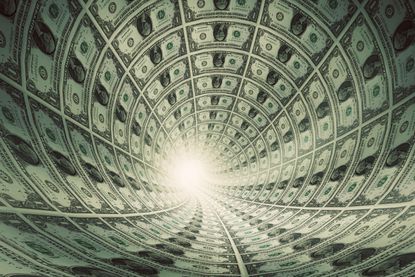Don't fear the inflationpocalypse
What the Trump administration gets right about the economy


The Trump administration isn't sweating inflation. And you know what? They're right not to.
The economy has been grinding away in a low-gear recovery ever since the Great Recession. After all these years, unemployment is finally back down to levels not seen since 2000. That's good! But it does cause many observers to worry about inflation — either because demand will go up (confident consumers with cash to burn will theoretically spend more, causing prices to spike) or because production will become more expensive (because a tight labor market means employers have to hike wages, causing prices to spike). And particularly after the GOP's massive deficit-increasing tax overhaul, and a recent budget deal that will increase spending by another $300 billion over the next two years, many veteran Democratic economic wonks worry that the economy is going to overheat, sparking major inflation.
The Trump team's response? Get lost, basically. "We're not worried about overheating in the economy," Gary Cohn, Trump's chief economic adviser, recently said.
Subscribe to The Week
Escape your echo chamber. Get the facts behind the news, plus analysis from multiple perspectives.

Sign up for The Week's Free Newsletters
From our morning news briefing to a weekly Good News Newsletter, get the best of The Week delivered directly to your inbox.
From our morning news briefing to a weekly Good News Newsletter, get the best of The Week delivered directly to your inbox.
He's right not to worry! Just ... maybe for the wrong reasons.
Trump's economic team argues that the recent tax cut package will boost business investments and research and development. That will juice productivity growth, which allows companies to offer employees wage increases and still make a profit without hiking prices. The idea is basically that allowing companies to keep more profits from their investments will encourage them to invest more.
The problem with that theory is that corporate profits have already grown to near-record highs — even as investment rates have collapsed. It's doubtful that cutting corporate taxes further and fattening profits even more will fix the problem.
But that doesn't mean inflation is around the corner.
The American economy could actually absorb a lot more demand before it overheats. Plenty of evidence suggests that the gap between actual GDP and potential GDP remains enormous. Lots of would-be workers remain sidelined, despite the low unemployment rate. That explains both the low inflation and slow wage growth that economic experts still treat as a big mystery.
Precisely because they're unlikely to drive up investments, the tax cuts won't add much aggregate demand either. They're far too tilted towards the wealthy to do much for middle-class Americans' everyday spending. Commentators keep referring to the tax cuts as "stimulus." That's not really true. They'll mostly just give rich people more money to uselessly stuff into the financial markets.
The additional government spending in the new budget deal is much closer to the kind of public investment we need. (Though you could wonder if an even bigger military is the wisest use of our resources.) But it still won't be nearly big enough to fill the hole in the economy, which means we won't get the kind of productivity boost that creates inflationary pressure.
But what if I'm wrong, and we do see a spike in inflation? Well, as Cohn correctly put it, "We know how to deal with inflation."
The Trump administration could just raise interest rates. Critics worry that this would choke off the very growth we're trying to achieve. But the economy has actually shouldered interest rates of 5 or 6 percent in the past just fine. We're not even at 2 percent now. There's plenty of room to grow. (As I've long argued though, we're raising interest rates too fast. The Federal Reserve is on a hair-trigger, ready to cut off any possible inflation before the recovery can finish its work. Let the economy heat up, then raise interest rates.)
So how else might we deal with inflation? Our lawmakers could (gulp) raise taxes.
To cool off the economy, you have to reduce overall spending. That might mean taking more money away from people. You couldn't focus tax hikes solely on the rich — it wouldn't be enough. But you could start at the high end: Eat into the upper class' spending first, and then move further down if you need to. (Hiking interest rates, by contrast, controls inflation by hurting the poorest Americans first.)
Obviously, it'll be a cold day in hell before the Trump administration ever did something like this. But it would behoove the White House's liberal critics to at least offer it as an alternative.
Regardless, the clear truth is this: The inflationpocalypse that so many economic wonks seem to fear is very unlikely to actually become reality. The Trump administration is sanguine about inflation. And they're right to be.
Sign up for Today's Best Articles in your inbox
A free daily email with the biggest news stories of the day – and the best features from TheWeek.com
Jeff Spross was the economics and business correspondent at TheWeek.com. He was previously a reporter at ThinkProgress.
-
 Today's political cartoons - November 2, 2024
Today's political cartoons - November 2, 2024Cartoons Saturday's cartoons - anti-fascism, early voter turnout, and more
By The Week US Published
-
 Geoff Capes obituary: shot-putter who became the World’s Strongest Man
Geoff Capes obituary: shot-putter who became the World’s Strongest ManIn the Spotlight The 'mighty figure' was a two-time Commonwealth Champion and world-record holder
By The Week UK Published
-
 Israel attacks Iran: a 'limited' retaliation
Israel attacks Iran: a 'limited' retaliationTalking Point Iran's humiliated leaders must decide how to respond to Netanyahu's measured strike
By The Week UK Published
-
 US election: who the billionaires are backing
US election: who the billionaires are backingThe Explainer More have endorsed Kamala Harris than Donald Trump, but among the 'ultra-rich' the split is more even
By Harriet Marsden, The Week UK Published
-
 US election: where things stand with one week to go
US election: where things stand with one week to goThe Explainer Harris' lead in the polls has been narrowing in Trump's favour, but her campaign remains 'cautiously optimistic'
By Harriet Marsden, The Week UK Published
-
 Is Trump okay?
Is Trump okay?Today's Big Question Former president's mental fitness and alleged cognitive decline firmly back in the spotlight after 'bizarre' town hall event
By Harriet Marsden, The Week UK Published
-
 The life and times of Kamala Harris
The life and times of Kamala HarrisThe Explainer The vice-president is narrowly leading the race to become the next US president. How did she get to where she is now?
By The Week UK Published
-
 Will 'weirdly civil' VP debate move dial in US election?
Will 'weirdly civil' VP debate move dial in US election?Today's Big Question 'Diametrically opposed' candidates showed 'a lot of commonality' on some issues, but offered competing visions for America's future and democracy
By Harriet Marsden, The Week UK Published
-
 1 of 6 'Trump Train' drivers liable in Biden bus blockade
1 of 6 'Trump Train' drivers liable in Biden bus blockadeSpeed Read Only one of the accused was found liable in the case concerning the deliberate slowing of a 2020 Biden campaign bus
By Peter Weber, The Week US Published
-
 How could J.D. Vance impact the special relationship?
How could J.D. Vance impact the special relationship?Today's Big Question Trump's hawkish pick for VP said UK is the first 'truly Islamist country' with a nuclear weapon
By Harriet Marsden, The Week UK Published
-
 Biden, Trump urge calm after assassination attempt
Biden, Trump urge calm after assassination attemptSpeed Reads A 20-year-old gunman grazed Trump's ear and fatally shot a rally attendee on Saturday
By Peter Weber, The Week US Published